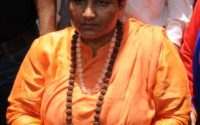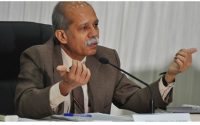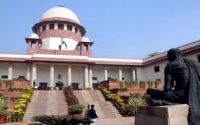Latest amendments endanger democracy
Source: news.yahoo.com
The latest amendment to the Unlawful Activities Prevention Act (UAPA), with the simultaneous dilution of the Right to Information Act, 2005 by allowing the Modi government to fix the tenure and salaries of the information commissioners while downgrading the Constitutional status of the chief information commissioner— spells danger to democracy. And with the BJP playing a pro-active role in appointing judges, the judiciary may not succeed in doing much.The right to dissent is a fundamental democratic right, but this right has been diluted by allowing the Modi government to decide who is a terrorist and who is not, so that inconvenient persons like Arun Ferreira may get short shrift.
A third bill, the National Medical Commission Bill, 2019, which replaces the scam-tainted Medical Council of India with doctors who are selected and not elected, allows private medical colleges to charge exorbitant fees for 50 per cent of the seats, so only the rich-and-affluent can become doctors. Their children who lack merit but not money, will try to recover from gullible patients the huge sums spent by their parents to make them doctors. But first, let us dissect the UAPA. The murders of journalist Gauri Lankesh and rationalists like MM Kalburgi and Narendra Dabholkar can be cited as unlawful activities indulged in by a prominent right-wing terror group which thrives at Ponda in Goa. Their mentor has not been arrested and former senior public prosecutor Rohini Salian went on record to declare she was told by the NIA to go slow on alleged “saffron” terrorist suspects involved in the Malegaon blasts. The BJP gave a ticket to a prominent MP who eulogized Nathuram Godse as a patriot, embarrassing Narendra Modi. So, this amendment is dangerous.
The Prevention of Terrorism Act or POTA was scrapped because it was misused against a certain minority which left the government with the 1963 UAPA to ban unlawful activities. The UAPA was amended in 2004, 2008 and 2012 to give it more teeth. But the 2012 amendment was withdrawn by Parliament after POTA was scrapped. After the 2008 Mumbai terror attacks, the UAPA was given more teeth to be used against terror groups and not individuals. Experience has proved that successive anti-terror laws may have been misused against individuals like Kobad Ghandy and Arun Ferreira, who were both Marxists. TADA, which was in force between 1985 and 1995 (modified in 1987), was renewed in 1989, 1991 and 1993 before it was allowed to lapse in 1995 because it was misused against a religious minority. There is no reason why the amended UAPA will also not be misused.
The BJP’s move to set up a so-called missionary cell in Christian-majority Mizoram to allegedly provide 24×7 help to missionaries being attacked by saffron groups is a subterfuge, because its main aim is to create a database of the over 5,000-odd Christian missionaries in Mizoram to ensure this Christian state will join the mainstream which voted for the BJP. And the amended UAPA can be used against those engaged in conversions which is an unlawful activity. After POTA was scrapped, most of its provisions were re-incorporated in UAPA. The 2012 amendment was used to combat money laundering and terror financing. Simultaneously with the UAPA amendment, the argument of the BJP that the Chief Information Commissioner should not be on par with the Chief Election Commissioner does not stand because the right to information is a constitutional right like the right to vote.
Both these rights emanate from Article 19 which is a fundamental right. The Modi government has also sat on the files of inconvenient judges like Akil Qureshi who was to have been made the chief justice of the Madhya Pradesh high court after his name was reiterated by the Supreme Court collegium, so that judicial independence is slowly turning into a myth. There is no doubt that with its huge majority, the Modi government will dilute inconvenient laws like the right to information. With 282 MPs in the Lok Sabha, Ram Rajya may be anti-thetical of inconvenient judges who strike down what the Modi government wants to achieve which includes allowing the rich and influential to make their children doctors. These doctors will then push up medicare so that the poor will not be able to afford them. Like farmers who cannot repay their loans.
There has been no discussion on the National Medical Commission Bill, 2019 which will allow Narendra Modi and his trusted men to nominate doctors of their choice on the Commission. The government argues that capping fees for private medical colleges will prevent them from entering this lucrative business where a former Orissa high court judge IM Quddusi has been charge-sheeted by the CBI for ensuring a private trust, which managed a sub-standard medical college, could admit medical students. What has not been stated is that politicians manage some of these private medical colleges which fund political parties during elections. Former apex court judges like Jasti Chelameswar and Kurian Joseph had accused the 45th Chief Justice of India Dipak Misra of being controlled by an unseen hand. One of the cases which the former CJI asserted he had the prerogative to form benches of his choice was the medical colleges scam, where the central government was directed to re-examine why some of 42 private medical colleges could not admit aspiring medicos.
Absolute power is a danger to democracy because it enables the BJP to enact laws to rake in wealth—forget the poor and hungry. With the latest amendments to the UAPA, the RTI and law minister Ravi Shankar Prasad asserting the government was not a mere post office in appointing judges to the 24 high courts and the Supreme Court, we are in for perilous times. And a few doctors with some judges may vouchsafe to that.
The writer holds a Ph.D in law and is a journalist-cum-lawyer of the Bombay High Court.



